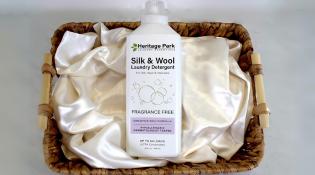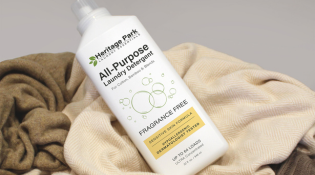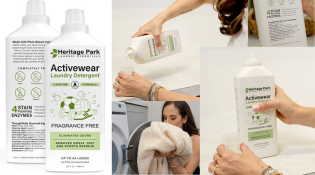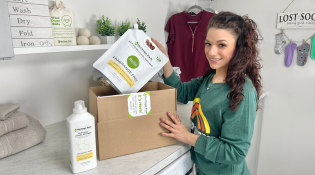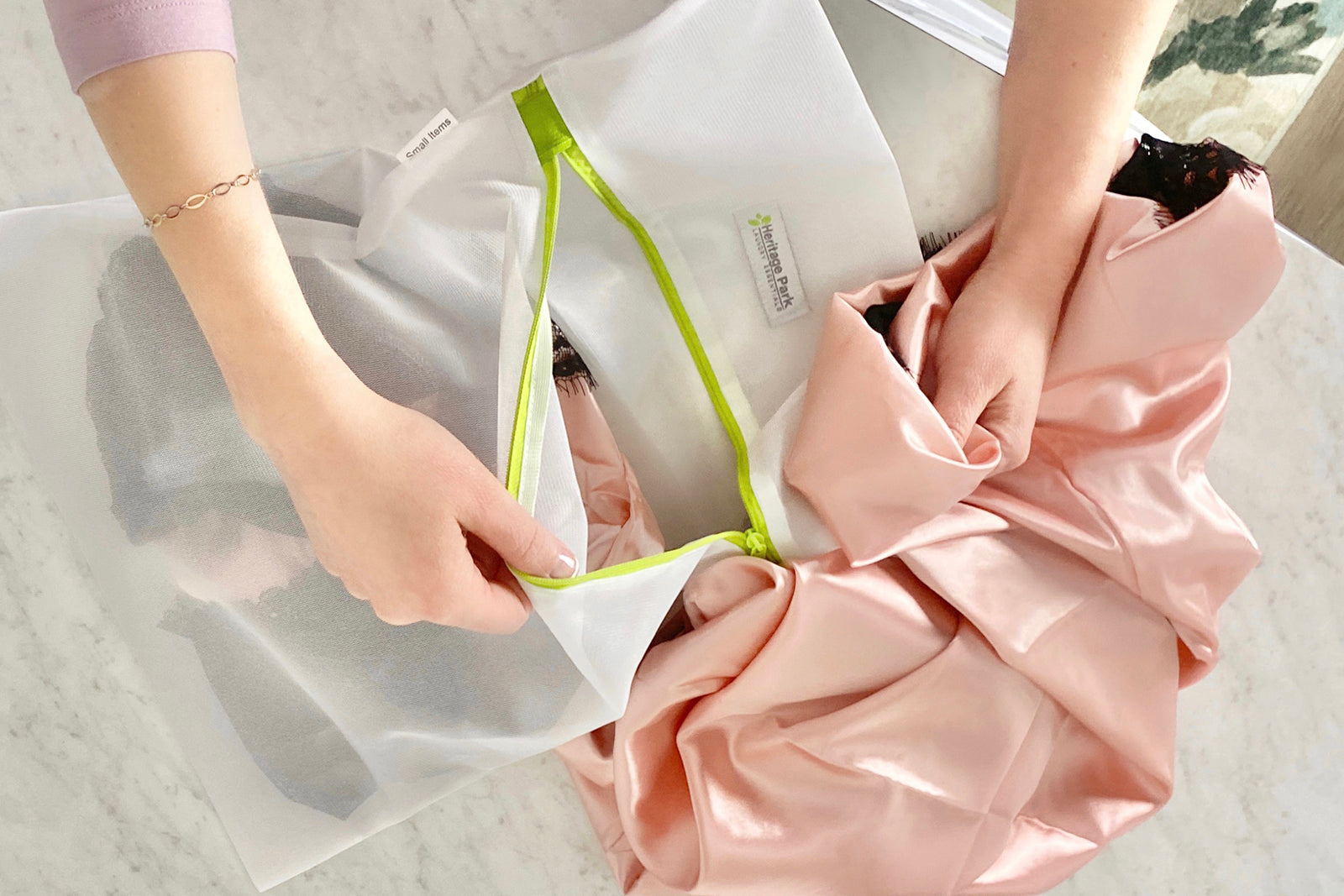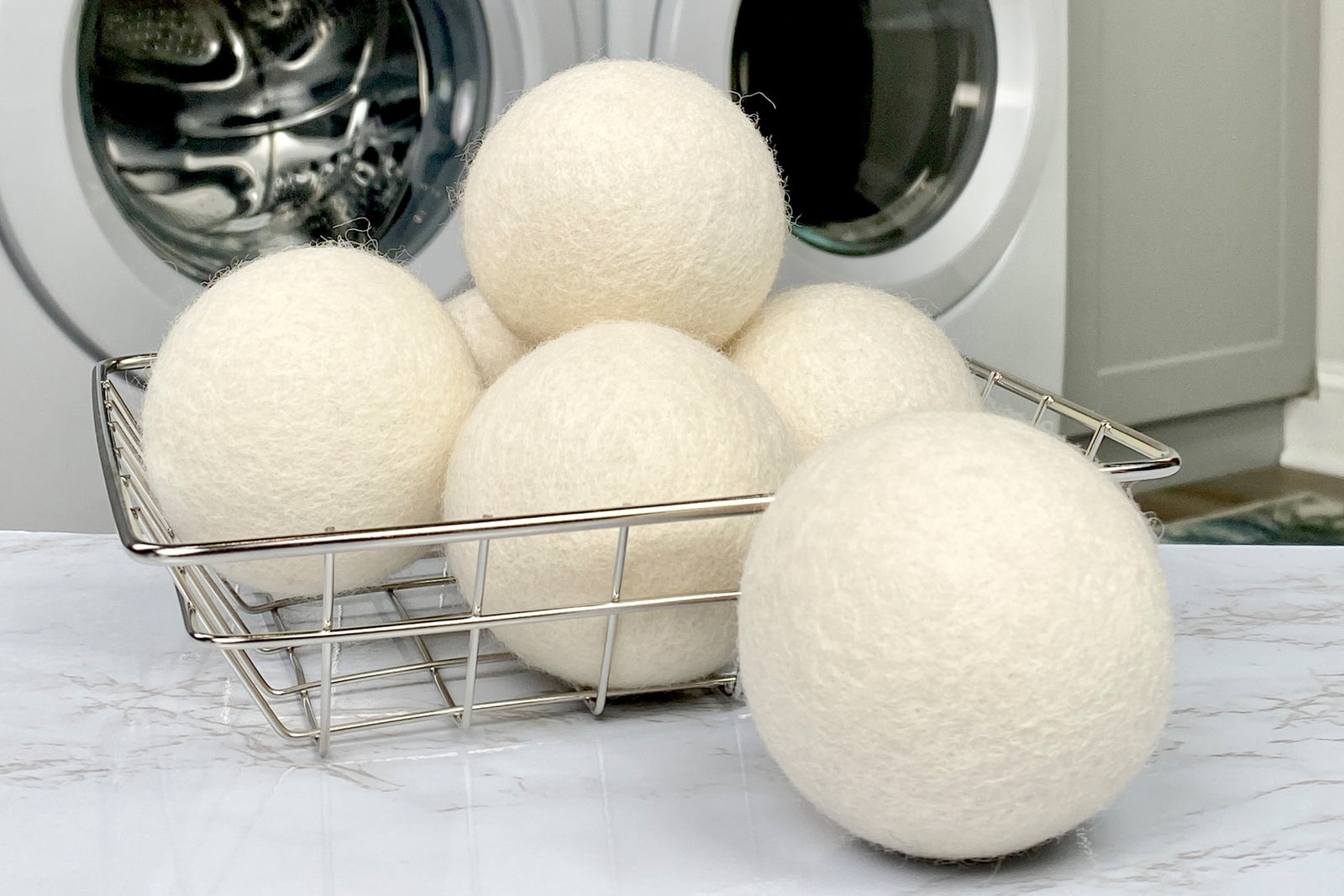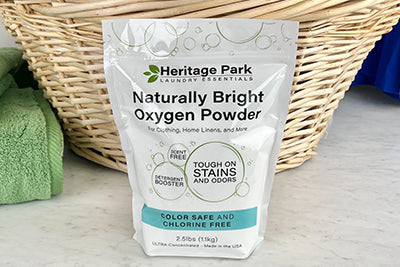Your washing machine can help, or hinder, your efforts to manage sensitive skin. Learn what to look for when choosing a washing machine that does the best job minimizing allergies and other irritants.
Key Takeaways
|
In our sensitive skin blog series, the Heritage Park Laundry Essentials team has shared a multitude of ideas for managing sensitive skin. We discussed the importance of using the right laundry detergent; how to navigate manufacturer claims; steps for building a sensitive skin laundry routine; and much more. In this final installment, we address a crucial question: does your washing machine support or sabotage your skin care routine? The right washer can eliminate allergens and detergent residue, while the wrong machine can trap irritants and trigger skin reactions, redness, and dermatitis flare-ups.

Why Your Washing Machine Matters for Sensitive Skin
After helping untold numbers of customers implement sensitive skin-friendly laundry routines, the Heritage Park team can say with confidence that choosing the right detergent is the most important factor in protecting sensitive skin. But it’s not the only one. Your washing machine determines whether that gentle detergent can effectively protect your skin from irritants, allergens, and residue that trigger contact dermatitis, atopic dermatitis, and other skin conditions that compromise skin barrier function.
Individuals with skin sensitivity face a dual challenge: eliminating allergens like dust mites and pet dander that cause allergic reactions and itchy skin, while avoiding harsh chemicals, synthetic fragrances, and detergent residue that trigger skin reactions. Those with dry sensitive skin or reactive skin types are particularly vulnerable to residue buildup that can cause burning sensations and irritated skin. Your washer must accomplish both goals without depositing new irritants onto your clothes and bedding.
The Root Causes: What Your Machine Must Address
Sensitive skin reactions stem from a few primary sources that your washing machine must effectively handle to prevent sensitive skin symptoms and maintain healthy skin barrier function:
Allergen Load Management
Dust mites, pet dander, pollen, and other allergens embedded in fabrics trigger allergic reactions, redness, and skin irritation. These microscopic irritants require hot water and thorough cleaning to eliminate completely, especially for those with reactive skin types.
Detergent Residue Prevention
Some detergents — especially powders — leave a residue. This residue accumulates in fabric fibers and causes skin reactions, itchy skin, burning sensations, and dermatitis flare-ups through prolonged skin contact. Individuals with dry sensitive skin or compromised skin barrier function are particularly susceptible to these skin concerns. A concentrated hypoallergenic formula like Heritage Park All-Purpose Fragrance-Free Detergent is the best choice for making sure your detergent is delicate on skin and rinses cleanly away.
Machine Contamination Control
Washing machines themselves can harbor mold, mildew, and bacterial growth that transfer to clothes and bedding. For individuals with skin sensitivity, even trace amounts of these contaminants can trigger severe allergic reactions and irritated skin.
Essential Features to Prioritize for Sensitive Skin Washing Machines
When shopping for a washing machine to support your skin care routine and address specific skin concerns, focus on these critical features that directly impact allergen removal, detergent residue prevention, and overall skin health for all skin types.
Allergen Removal Technology
Dedicated Allergen Cycles. The most important feature for those with skin sensitivity is specialized allergen cycles that use high temperatures (130°F+) and extended wash times to eliminate dust mites, pet dander, and other allergens that cause redness and allergic reactions. Brands like LG, GE, Whirlpool and Samsung offer these specialized programs that have been independently certified for allergen reduction (NSF P351 protocols) for allergen to help prevent sensitive skin symptoms.

Hot Water Performance. Effective allergen elimination requires sustained temperatures above 130°F maintained throughout the entire wash cycle, not just briefly. This capability is essential for killing dust mites and sanitizing fabrics without harsh chemicals.
Thorough Rinsing Capabilities
Programmable Extra Rinse. Your washer must offer multiple consecutive rinse cycles or dedicated sensitive skin settings. This feature is non-negotiable for those with skin conditions like dermatitis, as it prevents detergent residue that triggers contact dermatitis, burning sensations, and irritated skin.
Precise Water Temperature Control. The ability to wash at specific temperatures (86°F for delicates, 130°F+ for allergen removal) helps preserve fabric softness while eliminating irritants. Temperature precision prevents both inadequate cleaning and fabric damage.
Machine Design and Construction
Stainless Steel Drums. Stainless steel drums resist bacterial growth and don't absorb detergent residue or allergens like plastic or porcelain surfaces. This material choice supports skin care goals and prevents contamination buildup that can compromise skin barrier function.
Oversized Drum Capacity. Large load capacity allows better water circulation and more thorough rinsing, even with small load sizes. More water per garment means better dilution of allergens and more effective detergent residue removal.
Advanced Cleaning Technology
Steam Integration. Steam cycles provide chemical-free sanitization that penetrate fabric fibers to lift allergens and eliminate bacteria without introducing new irritants. This technology is particularly valuable for those with dry sensitive skin and facial skin sensitivities, offering sanitization without harsh skin care products that could trigger skin reactions.
These features work together to create a washing environment that eliminates allergens, removes detergent residue, and prevents machine contamination — addressing the primary skin concerns for individuals with various skin types and skin conditions. Prioritize machines that offer multiple rinse options and allergen cycles over basic models, as these capabilities directly impact your skin health, comfort, and overall skin barrier function.
Washing Machine Types: Sensitive Skin Comparison
|
Machine Type |
Pros for Sensitive Skin |
Cons for Sensitive Skin |
|
Traditional Top Load Washers |
|
|
|
Front Load Washer |
|
|
|
High-Efficiency (HE) Models |
|
|
|
Compact Washer Units |
|
|
Heritage Park's Washing Machine Recommendations
Any type of washing machine can help you manage sensitive skin with careful operation. However, based on our own experience laundering clothing for family members with sensitive skin, we prefer a traditional top-load washer. Here’s why:
Superior Water Circulation
Traditional top load washers use more water per load, creating better dilution of allergens and more thorough detergent removal. This abundant water circulation is crucial for protecting individuals with skin sensitivity and preventing the buildup of irritants that can trigger irritation (rash, redness and burning sensations).

Reduced Mold and Mildew Accumulation
Unlike front loading washers, top-loading models don't trap moisture in gasket areas where mold and bacteria can thrive. For individuals with reactive skin types prone to allergic reactions, this reduced contamination risk is significant for minimizing allergies.
Easier Machine Maintenance
Traditional top load washers are simpler to clean with vinegar and baking soda treatments that remove detergent residue and prevent bacterial growth. Regular maintenance is essential for households with skin concerns to prevent irritants that can cause itchy skin and sensitive skin symptoms.
Laundry Flexibility/Mid-Cycle Additions
Most top-loading design washers permit mid-cycle additions (for example, vinegar for extra cleaning or baking soda for odor neutralization).
Machine Cleaning and Maintenance for Sensitive Skin
Monthly Cleaning Protocol
Clean your washer monthly with vinegar and baking soda to prevent mold, mildew, and detergent residue buildup, especially if you have a front-loading, HE machine. This maintenance is crucial for households with skin sensitivity where even trace contaminants can trigger skin reactions, redness, and compromise skin barrier function.
Load Size Management
Avoid overloading your washer to ensure adequate water circulation and rinsing. Those with sensitive skin conditions require that laundry is cleaned and rinsed thoroughly to prevent detergent residue and irritated skin. This is difficult to do with overcrowded loads.
Water Temperature Monitoring
Verify that your water heater and washing machine maintain temperatures necessary for allergen elimination. Lukewarm water won't kill dust mites or remove allergens effectively.
How to Shop for a Skin-Safe Washing Machine Shopping
-
Do your homework. Major retailers like Home Depot carry washing machines with allergen cycles, but research specific models before visiting. LG, GE, Samsung, Electrolux and Whirlpool all offer models with allergen-reducing features and cycles.
-
Your zip code may matter. Search for local efficiency rebates that might offset the higher cost of washing machines with allergen cycles and extra rinse features.
-
Don’t go too compact. Laundry centers (washer/dryer combo units) offer space savings but may compromise water circulation and rinsing efficiency compared to full-size individual units.
-
Understand the settings and cycles. Check these out before you buy, and be sure to read the user instructions completely before using your new washer.
Beyond the Machine: Complete Sensitive Skin Laundry Strategy
Detergent Selection: Always the First Step
The perfect washing machine still requires the right laundry detergent and skin care products. Heritage Park All-Purpose Fragrance Free Detergent provides the gentle, effective cleaning your skin type needs without harsh chemicals or irritants. Our detergent is plant-based and pH neutral to protect skin and fabrics. The ingredients list contains no harsh chemicals; instead, our All-Purpose Detergent cleans with a proprietary blend of enzymes that work to break down and remove dirt, stains, and odors. For washing silk, wool, and other natural fibers, choose enzyme-free Heritage Park Silk and Wool Detergent, Fragrance Free. Our fragrance-free detergents are lab-certified hypoallergenic and pediatrician and dermatologist tested. All of our detergents, including the lightly scented varieties, are EWG verified.
Avoid Fabric Softener and Dryer Sheets
Never use fabric softener or dryer sheets, regardless of your washing machine type. These products leave waxy residues that trigger dermatitis, allergic reactions, and can cause redness and irritated skin, particularly problematic for those with reactive skin types. Instead, use natural wool dryer balls to soften and speed drying time.
Cold Water vs Hot Water Balance
Use cold water for delicate clothes and colors, but prioritize warm to hot water for bedding, towels, and items requiring allergen removal. Your machine should handle both effectively.
Pamper Your Sensitive Skin on Laundry Day and Every Day
The best washing machines for people with skin sensitivity combine allergen elimination, thorough rinsing, and reliable maintenance. Traditional top load washers with allergen cycles, multiple rinse options, and stainless steel drums offer the best combination of features for most households dealing with skin concerns and various skin conditions.
Remember that your washing machine works in partnership with your detergent. Even the most advanced washer cannot compensate for harsh chemicals and irritants in conventional detergents. Combine a sensitive skin-friendly machine with Heritage Park's hypoallergenic formulations for optimal skin health.
As always, the Heritage Park team is here to answer any questions you have about our products and how you can make laundry day easier. Feel free to send an email or give us a call. We would love to hear from you.
Frequently Asked Questions
What's the best washing machine for sensitive skin and skin conditions?
Traditional top load washers with allergen cycles, multiple rinse options, and stainless steel drums offer the best features for individuals with skin sensitivity. Look for models with dedicated allergen cycles and programmable extra rinse cycles to prevent skin reactions and maintain healthy skin barrier function.
Are front loading washers bad for reactive skin types?
Front load washers can work for those with skin concerns, but they're more prone to mold and mildew growth in gasket areas that can trigger allergic reactions. They also use less water, which can reduce rinsing efficiency and lead to detergent residue that causes itchy skin. If choosing a front loading washer, prioritize models with allergen cycles and commit to rigorous cleaning maintenance and use second rinses.
Do I need an allergen cycle if I have dry sensitive skin?
Allergen cycles are highly beneficial for all skin types, especially if you have atopic dermatitis or experience allergic reactions to dust mites. These cycles use high temperatures and extended rinse times to remove allergens that trigger sensitive skin symptoms, redness, and burning sensations.
How often should I clean my washing machine to prevent skin irritation?
Clean your washer monthly with vinegar and baking soda to prevent detergent residue, mold, and bacterial buildup. Those with skin sensitivity require consistently clean laundry appliances to avoid irritant transfer that can compromise skin barrier function and cause irritated skin.
Can energy efficiency and skin care work together?
Yes, but prioritize features that address your specific skin concerns over energy efficiency ratings. Many modern washing machines offer both allergen cycles and energy efficiency, but thorough rinsing and hot water capability are non-negotiable for managing skin conditions and preventing skin reactions.
Should I replace my washer if I develop a skin condition?
Not necessarily. First, try Heritage Park detergent, implement extra rinse cycles, and maintain your current machine more frequently. If sensitive skin symptoms persist or you continue experiencing redness and irritated skin, consider upgrading to a washer with allergen cycles and better water circulation.
Are compact washers suitable for people with skin sensitivity?
Compact washers can work for small load laundry needs, but they may lack the hot water capacity and allergen cycle options that benefit those with reactive skin types. They're best suited for frequent washing of small loads rather than laundry management for households with various skin concerns.
Medical Disclaimer: The information provided in this article is for educational purposes only and is not intended as medical advice. Heritage Park Laundry Essentials is not providing medical advice, diagnosis, or treatment recommendations. We are not doctors or medical professionals. If you're experiencing persistent skin conditions, dermatitis, allergic reactions, or sensitive skin issues, please consult with your healthcare provider or dermatologist for proper medical evaluation and treatment. Always follow your healthcare provider's recommendations for managing your skin health.


